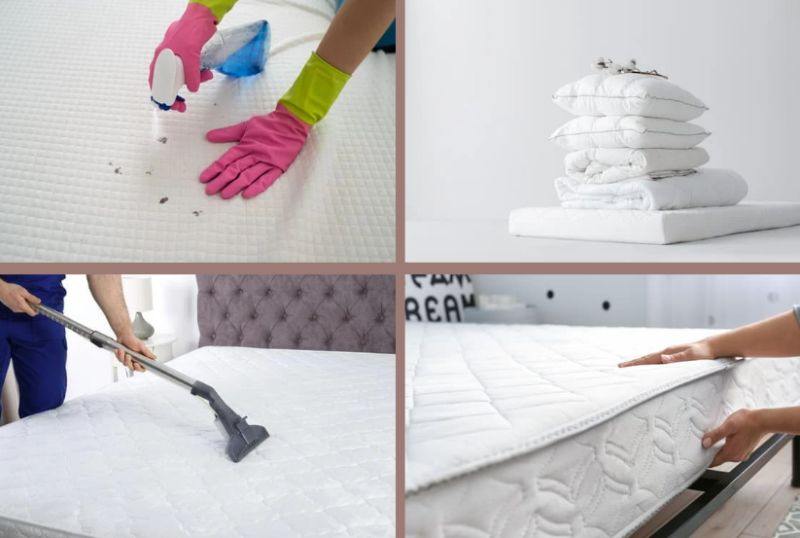A mattress is one of the most important purchases you can make for your health and well-being. A good mattress can provide you with comfort, support, and pressure relief, while a bad mattress can cause you to toss and turn, wake up with aches and pains, and affect your mood and energy levels. What about the question of how to choose a mattress that suits your needs and preferences? With so many options available on the market, it can be overwhelming and confusing to find the right one for you.
In this article, we will guide you through the process of how to choose a mattress, from the different types of mattresses to the factors to consider to the tips and tricks to make the best decision. We will also share some of the best mattresses for different sleeping positions, body types, and budgets, based on our expert reviews and ratings. By the end of this article, you will have a clear idea of what to look for and what to avoid when shopping for a mattress, and you will be able to find the perfect match for your sleep.
How to Choose a Mattress

When choosing a mattress, there are several factors to consider. These include firmness level, material, sleeping position, body type, budget, and more.
Firmness level refers to how soft or hard a mattress feels.
It can range from 1 to 10, with 1 being very soft and 10 being very firm. The ideal firmness level depends not only on your personal preference but also on your sleeping position and body weight. Generally, side sleepers need a softer mattress to relieve pressure points, back and stomach sleepers need a firmer mattress to support the spine, and combination sleepers need a medium-firm mattress to accommodate different positions.
Material refers to what the mattress is made of.
The most common materials are foam, innerspring, hybrid, latex, and airbed. Each material has its own pros and cons, such as comfort, support, durability, temperature regulation, motion isolation, and noise. For example, foam mattresses are good at contouring to the body and isolating motion, but they can trap heat and sag over time. Innerspring mattresses are good at providing bounce and airflow, but they can be noisy and transfer motion.
Hybrid mattresses combine the benefits of foam and innerspring, but they can be expensive and heavy. Latex mattresses are good at being responsive and durable, but they can be costly and allergenic. Airbed mattresses are good at being adjustable and customizable, but they can be noisy and prone to leaks.
Sleeping position refers to how you sleep most of the time.
Your sleeping position affects how your spine, neck, and joints are aligned and how much pressure is exerted on different parts of your body. Different sleeping positions have different needs and preferences for mattress firmness and material. For example, side sleepers need a mattress that can cushion their hips and shoulders; back sleepers need a mattress that can support their lower back and maintain their natural curve; stomach sleepers need a mattress that can prevent their hips from sinking and causing back pain; and combination sleepers need a mattress that can adapt to their changing positions.
Body type refers to your height and weight.
Your body type affects how much you sink into or feel the surface of a mattress and how much support and comfort you need. Different body types have different needs and preferences for mattress firmness and material. For example, lighter sleepers (less than 130 pounds) need a softer mattress to feel more pressure relief and contouring; heavier sleepers (more than 230 pounds) need a firmer mattress to prevent excessive sagging and provide more support; and average sleepers (130 to 230 pounds) need a medium-firm mattress to balance comfort and support.
A budget refers to how much you are willing to spend on a mattress.
Your budget affects the quality, durability, and features of the mattress you can afford. Different mattress materials have different price ranges, depending on the materials, construction, and brand. For example, foam mattresses are usually the cheapest, followed by innerspring, hybrid, latex, and airbed mattresses. However, price is not the only indicator of quality, and you can find good-value mattresses in any material category if you do your research and compare options.
How to care for a mattress

Caring for a mattress
It can extend its lifespan and improve its performance. There are some basic steps you can take to keep your mattress clean, fresh, and comfortable. These include rotating or flipping your mattress, using a mattress protector, changing your sheets and bedding, cleaning your mattress, and addressing stains and odors.
Rotating or flipping your mattress
It can help prevent uneven wear and tear and prolong its durability. Depending on the type and design of your mattress, you may need to rotate it from head to foot, flip it over, or both. Check your manufacturer’s recommendations for how often and in what direction you should rotate or flip your mattress. A good rule of thumb is to rotate or flip your mattress every 3 to 6 months, or more often if you notice signs of sagging or indentations.
Using a mattress protector
It can help protect your mattress from spills, stains, dust mites, allergens, and bed bugs. A mattress protector is a cover that encases your mattress and can be either zippered or fitted. It can be made of various materials, such as cotton, polyester, or vinyl, and can be either waterproof or water-resistant. A mattress protector can also add some extra comfort and breathability to your mattress. You should wash your mattress protector regularly, following the care instructions on the label.
Changing your sheets and bedding
It can help keep your mattress hygienic and comfortable. Your sheets and bedding can accumulate sweat, body oils, dirt, and other contaminants, which can seep into your mattress and cause odors, stains, and damage. They can also attract dust mites and other allergens, which can affect your sleep quality and health. You should wash your sheets and pillowcases at least once a week, or more often if you have pets, allergies, or skin conditions. You should also wash your blankets, comforters, and duvets every few months, or more often if they get dirty or smelly.
Cleaning your mattress
It can help remove dust, dirt, and debris that can build up over time and affect your sleep quality and health. You should vacuum your mattress every few months, using the upholstery attachment of your vacuum cleaner. You should also sprinkle some baking soda on your mattress and let it sit for a few hours, then vacuum it again.
This can help deodorize and freshen up your mattress. You can also use a mild detergent and a damp cloth to spot clean any stains or spots on your mattress, but avoid soaking or saturating your mattress with water or any liquid, as this can cause mold and mildew growth. You should also let your mattress air out and dry completely before putting your sheets and bedding back on.
Addressing stains and odors
It can help restore your mattress to its original condition and prevent further damage. You should act quickly and blot any spills or stains with a clean cloth or paper towel, then use a mild detergent and a damp cloth to spot clean the affected area. You can also use a homemade or commercial stain remover, depending on the type and severity of the stain. For example, you can use hydrogen peroxide, vinegar, or lemon juice to remove blood stains; dish soap or shaving cream to remove urine stains; or rubbing alcohol or enzyme cleaner to remove vomit stains.
You should always test a small, inconspicuous area of your mattress before applying any stain remover, and follow the instructions on the label. You should also avoid using bleach or ammonia, as they can damage the fabric and materials of your mattress. To remove odors, you can use baking soda, vinegar, or essential oils, depending on the source and intensity of the odor. For example, you can use baking soda to remove general odors, vinegar to remove musty or moldy odors, or lavender or eucalyptus oil to add a pleasant scent to your mattress. You should always let your mattress air out and dry completely after treating any stains or odors.
How to get the most out of your sleep

Getting the most out of your sleep
It can improve your physical, mental, and emotional well-being. There are some simple tips and strategies you can follow to enhance your sleep quality and quantity. These include sticking to a sleep schedule, paying attention to what you eat and drink, creating a restful environment, limiting daytime naps, including physical activity in your daily routine, and managing worries.
Sticking to a sleep schedule
It can help regulate your circadian rhythm, which is your body’s natural sleep-wake cycle. You should aim to go to bed and wake up at the same time every day, even on weekends and holidays. This can help you fall asleep faster, sleep deeper, and wake up more refreshed. You should also avoid sleeping in or catching up on sleep on weekends, as this can disrupt your circadian rhythm and make it harder to fall asleep and wake up on weekdays.
You should also avoid changing your sleep schedule too drastically when traveling across time zones, as this can cause jet lag and affect your sleep quality and health. You should try to adjust your sleep schedule gradually before and after your trip and expose yourself to natural light and darkness at the appropriate times to help your body adapt to the new time zone.
Paying attention to what you eat and drink
It can affect your sleep quality and quantity. You should avoid eating large or heavy meals within three or four hours of bedtime, as this can cause indigestion, heartburn, or reflux, which can interfere with your sleep. You should also avoid eating spicy, fatty, or sugary foods, as they can stimulate your metabolism and keep you awake. You should also avoid drinking caffeine, alcohol, or nicotine close to bedtime, as they can disrupt your sleep. Caffeine is a stimulant that can keep you alert and energized for several hours, so you should avoid drinking coffee, tea, energy drinks, or chocolate after mid-afternoon.
Alcohol is a depressant that can make you feel sleepy at first, but it can also disrupt your sleep stages, reduce your sleep quality, and cause you to wake up more often during the night. Nicotine is also a stimulant that can keep you awake and make it harder to fall asleep. You should also avoid drinking too much fluid before bed, as this can make you need to urinate more often during the night, which can disrupt your sleep.
You should drink enough water throughout the day to stay hydrated, but limit your intake in the evening. You should also drink some warm milk or tart cherry juice before bed, as they contain melatonin, which is a hormone that regulates your sleep-wake cycle and helps you fall asleep.
Creating a restful environment
It can help you relax and sleep better. You should make your bedroom as cool, dark, and quiet as possible, as these conditions are optimal for sleep. You can use curtains, blinds, or shades to block out any external light, or wear an eye mask if you prefer. You can also use earplugs, a fan, a white noise machine, or a humidifier to mask any unwanted sounds, or listen to some soothing music or sounds, such as rain, ocean waves, or classical music.
You should also make sure your mattress, pillow, sheets, and blankets are comfortable and suit your preferences. You can invest in some quality bedding materials, such as cotton, silk, or flannel, that feel soft and cozy on your skin. You can also adjust the temperature of your room and your bedding to your liking, but avoid making it too hot or too cold, as this can disrupt your sleep.
Limiting daytime naps
It can also help you sleep better at night. While napping can be beneficial for some people, especially those who are sleep deprived or have irregular schedules, it can also interfere with your nighttime sleep if you nap too long, too late, or too frequently. Napping can reduce your sleep drive, which is the natural urge to sleep that builds up throughout the day, and can also confuse your circadian rhythm, which is your internal clock that tells you when to sleep and when to wake up.
If you do nap, you should limit it to no more than 20 minutes and avoid napping after 3 p.m. You should also avoid napping if you have insomnia or difficulty falling asleep or staying asleep at night. If you feel sleepy during the day, you can try some alternative ways to boost your energy, such as drinking some water, getting some fresh air, doing some physical activity, or exposing yourself to some bright light.
Where to Buy the Best Mattresses Online
If you are looking for the best mattresses online, you have many options to choose from. You can browse through different types, brands, sizes, and prices of mattresses on various online platforms, such as Amazon, Wayfair, Best Buy, Sears, and more. You can also check out some specialized online mattress retailers, such as Tuft & Needle, Casper, Leesa, Nectar, Purple, and more.
These online mattress companies offer high-quality mattresses that are delivered to your door in a box, along with free shipping, generous trial periods, and warranties. You can also read some expert reviews and ratings of the best online mattresses, such as these Best Online Mattresses of 2023 by US News, these Best Online Mattresses of 2023 by Mattress Nerd, or these Best Online Mattresses of 2023 by HGTV.
Choosing a Mattress is not an easy task
To sum up how to choose a mattress, picking the right one can make a huge difference in your sleep quality and well-being. A good mattress can provide you with comfort, support, and pressure relief, while a bad mattress can cause you to toss and turn, wake up with aches and pains, and affect your mood and energy levels. That’s why it’s important to consider the different types of mattresses, the factors that influence your choice, and the tips and tricks to make the best decision.
In this article, we have shown you some of the best mattresses for different sleeping positions, body types, and budgets, based on our expert reviews and ratings. We have also given you some helpful advice on how to choose a mattress, how to care for your mattress, and how to get the most out of your sleep. We hope that this article has helped you find the perfect match for your sleep and that you enjoy your new mattress for years to come. Remember, a good night’s sleep is priceless, and you don’t have to break the bank to achieve it.






